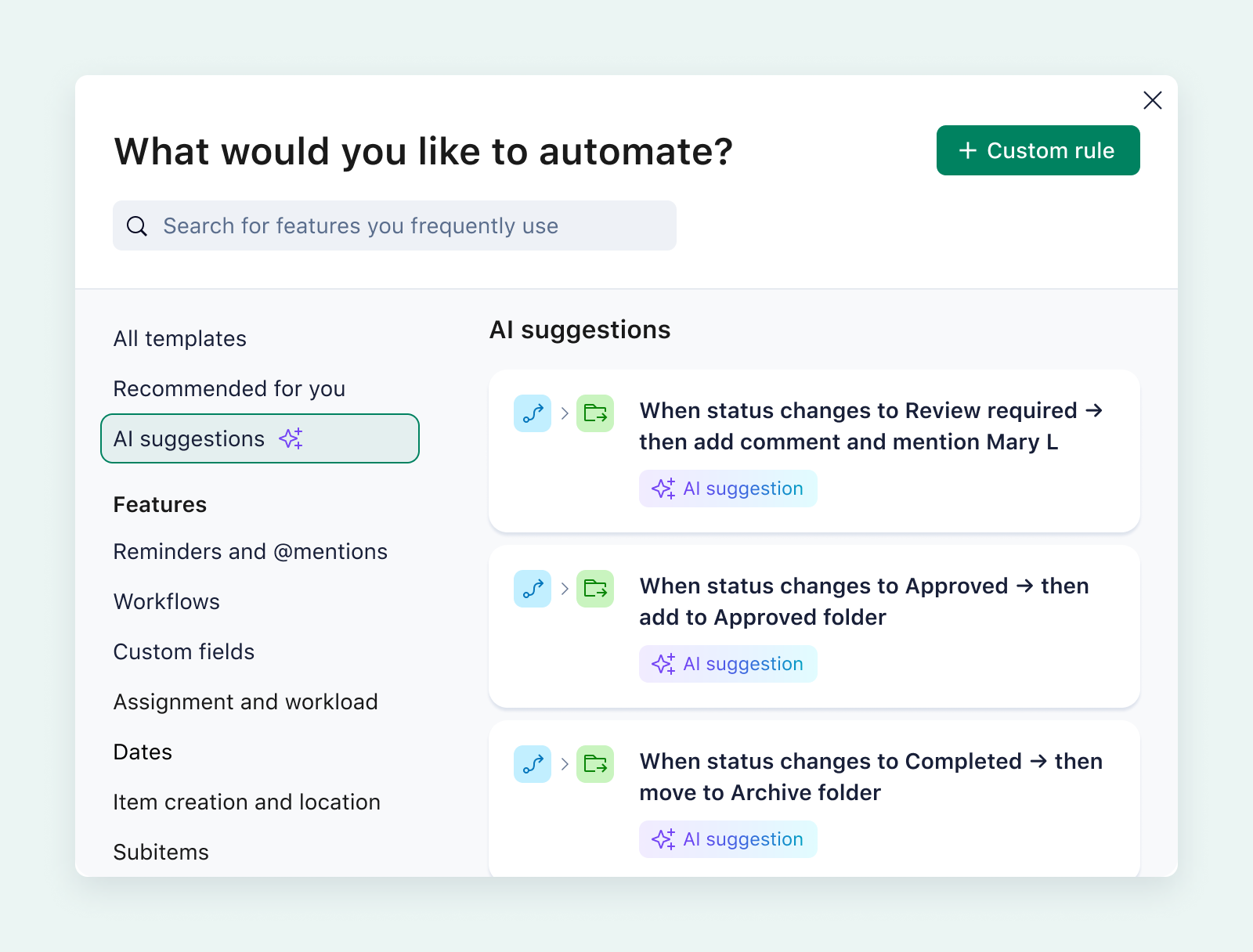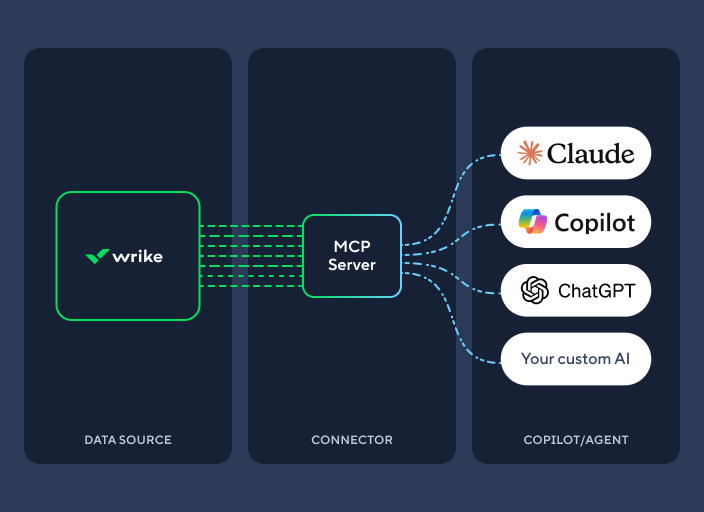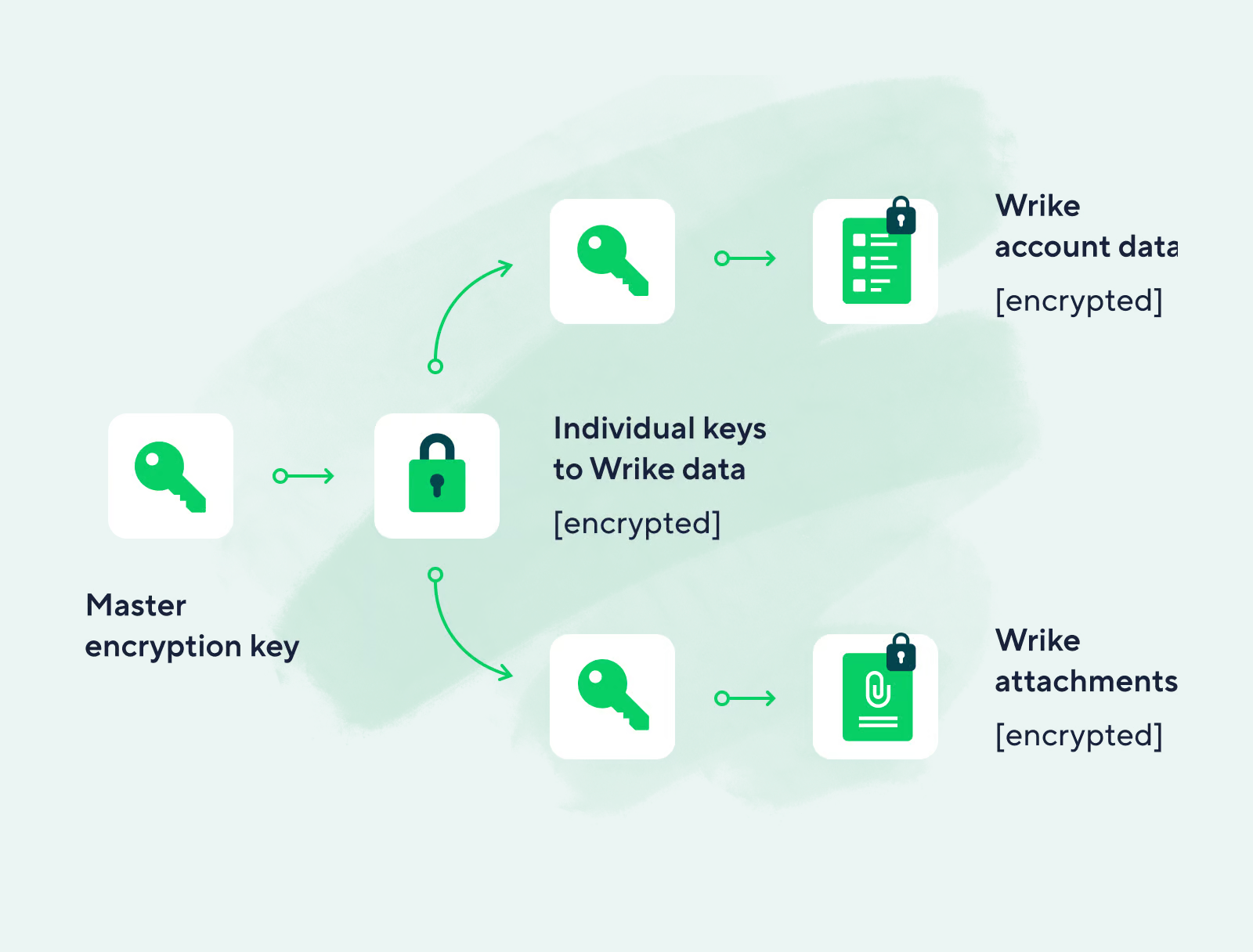Key takeaways:
- Agentic AI tools like Microsoft Copilot and Claude are widely used but require high-quality data to be truly effective.
- Public data is accessible to all, but proprietary data gives organizations a unique competitive advantage.
- Wrike research shows that 87% of employees have concerns about AI agents, mainly around data accuracy, privacy, and context. Most organizations don’t effectively centralize, connect, or optimize their data, despite its inherent value.
- The solution to this is Wrike’s MCP Server, which securely connects AI agents to real-time, proprietary business data, enabling smarter, more relevant AI-powered assistance.
- Companies using proprietary data in AI achieve higher productivity and revenue growth, according to McKinsey and Gartner. However, it’s up to leadership to drive this cultural change.
- Wrike’s award-winning Work Intelligence® suite — including Datahub and MCP Server — helps organizations break down silos, embed knowledge capture into daily work, and maximize AI’s value.
At the start of the year, we gathered Wrikers together for our annual global kickoff event, where topics included high-level strategy and goals, key growth levers, a full product roadmap, and our go-to-market plans.
Underpinning all of this is what we’re seeing, as well as anticipating, in the market.
As CEO of Wrike, it’s my responsibility to identify and understand trends that will impact our business and ensure we factor those trends into our plans. One such trend was the value of proprietary data.
I had been keeping an eye on the use of public data in AI and could tell organizations would soon hit the benefits threshold. After a while, the value of public data goes down because it’s just that — public.
It’s hard to differentiate and build a competitive edge when everyone — including your competitors — is working with the same information. I could see the emergence of a real need to incorporate internal, or proprietary data.
Revealing research into agentic AI
To better understand how agentic AI tools such as Microsoft Copilot, Anthropic’s Claude, and Perplexity are used in the workplace, we surveyed more than 1,000 full-time knowledge workers around the world. The resulting report, “The secret to smarter agentic AI? Deeper context,” indicates that almost two-thirds of workers use AI agents provided by their employer. But what do those tools look like? What are they doing? And how can AI be truly transformational in this age of global access?
Our research surfaced some interesting answers to these questions, but one result stood out from the rest: for agentic AI to work, it needs data.
For it to work well, it needs proprietary data.
Wrike is uniquely positioned to help in this area, which is why the research results were so interesting to me. Our workflow management platform acts as a powerhouse of proprietary data, collecting and organizing a vast array of workflow information, from routine tasks to goal tracking to financial statistics and long-term strategy.
This context engine can drive incredible results by seamlessly connecting AI agents to your most valuable asset — your proprietary business data.
If you want to learn more about our findings, read our Chief Product Officer, Alexey Korotich’s analysis below.

A lack of confidence in agentic AI
One of the most interesting findings of our survey is that while adoption rates for employees with access to an AI agent are high (53% use available tools daily; 34% weekly), they’re not all at ease with the technology.
In fact, an overwhelming majority — 87% — of employees expressed some type of mistrust. The top five concerns about using AI agents at work were:
| No. 1 | It will act on inaccurate or incomplete information | 37% |
| No. 2 | It will introduce new data privacy concerns | 31% |
| No. 3 | It won’t understand the context of my work | 28% |
| No. 4 | It might make my job obsolete | 23% |
| No. 5 | It will introduce errors I have to fix | 19% |
This all makes sense: The only thing worse than no assistant is a bad assistant.
We’ve all experienced AI giving us incorrect information and imaginary sources. To have it go one step further and act on that faulty information could be very problematic. This probably explains why 24% of respondents say they’d never use an AI agent if their company offered it in the future, which is a real challenge for leaders who want to stay at pace or ahead of AI-powered competitors.
The solution to this problem isn’t more tech — it’s better information. Our research shows that even companies that actively manage their data aren’t doing it very well. Some are even letting this valuable commodity slip through their fingers, through problems such as scattered information (41%), buried documents (37%), and lack of documentation standards (28%). This might account for some of the mistrust workers are feeling around the reliability of agentic AI.
That’s where a centralized source of truth like Wrike is vital; when the power of data is fully harnessed, it offers an incredible springboard for growth. When coupled with a secure connection between that proprietary data and agentic AI, the sky’s the limit.
Public data vs. proprietary data for agentic AI
By using public data, large language models (LLMs) have democratized access to AI, delivering unprecedented acceleration in the way we work. But the reality is that this public data has become table stakes, open to everyone. That puts us all on the same playing field, with little room for differentiation.
What sets market leaders apart is their ability to leverage their own unique information. Proprietary data is a game changer, capable of propelling companies far ahead of the competition.
Why? Because proprietary data provides deep context, subtle nuances, and highly valuable specificity that public data can’t. It’s a little like consulting with an experienced expert within your company, rather than checking Wikipedia for an answer.
Only someone — or something — from within will have the true institutional insights, product knowledge, and market understanding you need.
What makes proprietary data within Wrike so special is that it fuels agentic AI with detailed revelations about your organization’s way of working, including every goal, project, and task that’s performed. This means it can better analyze situations, predict outcomes, and perform appropriate actions that add real value to your bottom line.
Why does agentic AI need data?
Agentic AI needs data to operate effectively because data provides the context, information, and instructions required for autonomous decision making and task execution. Without access to relevant, accurate, and up-to-date information (what we refer to as proprietary data), agentic AI won’t be able to fully understand user intent, standard business processes, or the unique environment in which it functions.
Wrike MCP Server: Secure access to data that matters
A recent report by McKinsey & Co. listed “Customizing models using proprietary data” and “Integrating data, AI, and systems” as chief among their essential actions for adding “alpha” (an investment term referring to obtaining returns above benchmark levels).
Our recently launched Wrike MCP Server is the key to unlocking this advantage. It allows top AI assistants like Microsoft Copilot and Claude to securely connect with Wrike’s data in real time, offering smarter, faster, more streamlined work. In plain English? It empowers your agentic AI to do much more, much faster, and much better.
As our Chief Product Officer, Alexey Korotich, puts it, “This upgrade turns AI from a siloed helper into a true partner in your workflow, helping teams save time and collaborate better across tools.”
What is an MCP Server?
An MCP (Model Context Protocol) Server is a secure, intelligent bridge between agentic AI systems and an organization’s proprietary information. Unlike traditional integrations that just transfer data, an MCP Server provides rich context — like tasks, projects, and spaces — in real time and in an organized structure. This makes it easy for the agents to access the information they need to make smarter, more relevant, and far more reliable decisions with minimal human oversight.
It also offers immediate competitive benefits to the companies that implement it. Every day, we hear of new proposed use cases, including:
- Marketers asking their AI assistant detailed questions about campaign delivery metrics, accessing key performance indicators without deep-diving into data sets
- Manufacturers connecting agentic AI to Wrike to query production process delays, enabling fast course correction before delivery dates are affected
- Project managers using natural language to analyze budget burndown, uncovering specific nuances that standard reports may exclude
- Finance teams drawing on AI trained with proprietary business data to track patterns and assess risk based on real experience
A few weeks ago, I was on-site with one of our most strategic customers — a large global automotive company — and we launched Wrike MCP Server in the real world. They see immense value in plugging agentic AI into their vast data bank, facilitating immediate, accurate, and actionable answers based on 100% unique information tailored to their users’ everyday needs. It’s going to be exciting to see the future they forge with the AI advancements we roll out for our customers.
Of course, with so much valuable data floating around, security is of paramount importance, which is why Wrike MCP Server is equipped with enterprise-level safeguards, including robust access controls that ensure LLMs only receive authorized, context-appropriate data.
Wrike: Real, AI-powered advantage
It’ll come as no surprise to our customers that organizations with fully modernized, AI-led processes achieve 2.5x higher revenue growth and 2.4x greater productivity than their peers. However, attaining this level of AI integration is easier said than done.
Driving real cultural and technological change will require leadership, advocacy, and accountability. It’s not enough to buy piecemeal AI tools; successful companies will need to seek out scalable solutions that embed knowledge capture, workflow automation, and agentic AI into daily work.
The new Wrike MCP Server is a major step toward fulfilling this goal, offering a solution that actively connects every part of your organization, including your people, processes, and proprietary data. And it’s also only one part of our industry-leading Work Intelligence® solution.
Our award-winning advances also include generative AI, smart risk prediction, and fully automated workflows. Plus, our recent acquisition of Klaxoon opens the gates to even more valuable data. By integrating visual collaboration work — like product testing, executive planning meetings, or team brainstorming sessions — into Wrike, you’ll gain even more context, empowering agentic AI to make better, more informed decisions.
All of this offers our customers a unique suite of tools that goes far beyond the usual brouhaha about AI. We’re using AI to break down silos, supercharge productivity, and make work flow faster than ever. If you’re ready to see what that looks like in action, reach out to our sales team to get started.
In the meantime, I invite other SaaS leaders to connect with me on LinkedIn to discuss the value of proprietary data — and how Wrike can help you build a sustainable competitive advantage that could decide the future of your company in the age of agentic AI.
Methodology for “The secret to smarter agentic AI? Deeper context” report
Wrike surveyed 1,000 full-time knowledge workers in May 2025. Those employees were, at the time of the survey, all located in the U.S., 18 years or older, and employed at an organization with at least 1,000 employees globally. The workers were defined as employees working either fully in the office, fully at home, in a co-working space, or in a hybrid work setting.
FAQs on agentic AI and MCP Servers
FAQ 1: What is agentic AI, and how is it used in the workplace?
Agentic AI is the term used to describe autonomous systems that can set goals, make decisions, and execute tasks with minimal human input. In the modern workplace, agentic AI tools like Microsoft Copilot and Claude help automate repetitive tasks, analyze data, and streamline workflows. These tools, and other custom solutions, can assist with and accelerate a variety of tasks, including project management, customer support, and marketing analysis. This should allow employees to focus on higher-value work best performed by humans.
FAQ 2: Why is proprietary data important for agentic AI?
Proprietary data provides agentic AI with unique, organization-specific context that public data cannot offer. This deep context enables AI agents to make more accurate, relevant, and valuable decisions. By leveraging proprietary data, companies can gain a competitive advantage, improve productivity, and ensure that AI actions align with their specific business goals and processes.
FAQ 3: How does Wrike’s MCP Server enhance agentic AI performance?
Wrike’s MCP (Model Context Protocol) Server acts as a secure bridge between agentic AI systems and an organization’s proprietary data. It delivers real-time, structured information — such as tasks, projects, and workflows — directly to AI agents. This allows AI to operate with context, improving decision making, automation, and reliability. As part of our exceptional commitment to security, the MCP Server is safeguarded by strict security features and robust access controls.



